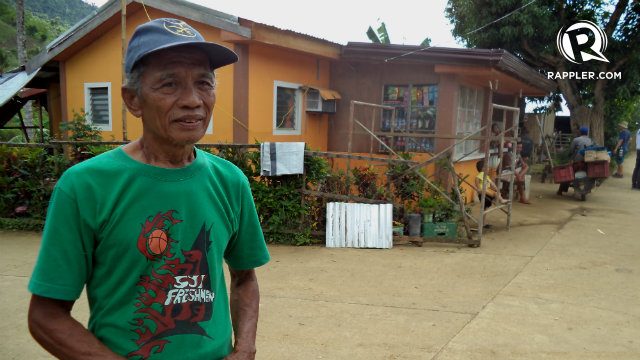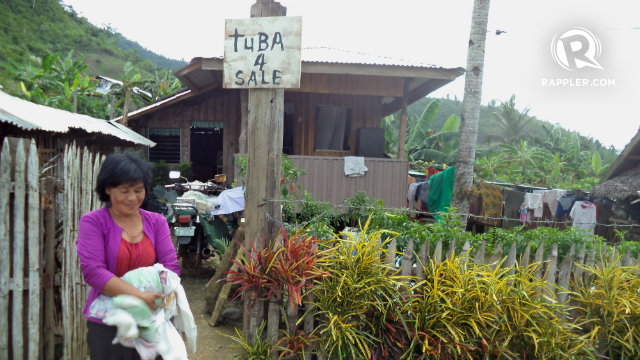SUMMARY
This is AI generated summarization, which may have errors. For context, always refer to the full article.

TACLOBAN, Philippines — Farewell for now, tuba.
He made his first batch of tuba (coconut wine) before he was even old enough to drink it. “Dose anyos ako noon, tinuruan ako ng kuya ko gumawa (I was 12 then. My older brother taught me how to make it),” Salvador Abordo recalled.
Abordo was no drunkard, but a hard worker.
From being his brother’s protégé, Salvador grew to master the craft of making tuba – a traditional Filipino alcoholic beverage – and made a living out if it. The brothers worked as coconut farmers. Together, their famous formula must have supplied hundreds and hundreds of fiestas throughout the years.
At 65, Salvador finally stopped mixing the drink. It was a forced retirement, he said.
“Wala nang niyog, paano pa (How can I, when there are no more coconuts)?” he asked.
Super typhoon Yolanda (Haiyan) left Salvador and many others not only homeless, but also jobless.
The Department of Agriculture reported earlier this year that Yolanda left the biggest scar on coconut and rice farmers. In fact, the coconut industry was damaged the most, with around 33 million coconut trees affected, amounting to P17.8 billion in production loss.
The tree of life is dead.
The Philippines is the world’s second largest coconut producer, according to the Food and Agriculture Organization (FAO). Eastern Visayas is the country’s second largest coconut producing region, next to Davao Oriental.
Ironically, even before Yolanda, farmers have also consistently ranked as the country’s second poorest basic sector, next to fisherfolks.
The Philippine Coconut Authority (PCA) has pledged to support the rehabilitation of the Visayas’ coconut industry by distributing coconut seedlings and fertilizers for free among farmer-beneficiaries. However, it would take 6 to 8 years for the coconut trees to return to full production, FAO reported.
Until then, farmers like Salvador need to find alternative sources of income.
Lost
“‘Di naman ganoon kalaki kita, pero sapat na sa pamilya (My earnings were not that big, but enough for my family),” Salvador said.
As a tuba farmer, he used to earn around P6,000 a month, enough to support his wife, 3 children, and one grandchild.
“Tuba talaga ang isa sa top livelihoods dito sa amin (Making tuba is really one of the top livelihoods here),” said Alma Tenibro, kagawad (councilor) of Barangay Basper in Tacloban City.
She added that after Yolanda, several men shifted from farming to working as drivers or vendors.
After Yolanda, Salvador began working as a locksmith and a carpenter, repairing homes ravaged by Yolanda. “Pa-ekstra ekstra lang. Minsan 3 araw lang, tapos wala na ulit kita (I just have sidelines. Sometimes work lasts only 3 days, then I have no income again),” he added.
There will always be homes that need fixing, even a year after Yolanda. Not all of them, however, can afford to hire people to do the repairs.
He was lost, the old man admitted. “Akala ko talaga katapusan na ng mundo ko (I really thought it was the end of my world).”

Just as Salvador quit the tuba business, an old woman just started hers.
Unlike Salvador who climbs trees and makes the tuba himself, the woman gets her supplies from Catbalogan, Samar. “Di kasi nasira mga puno nila (Their trees were not destroyed),” she said.
She buys tuba at P750 per 5-gallon jug, and sells it at P190/gallon.
At first, income was quite good since local tuba makers were rare in her area. However, a village rumor killed her luck.
“Nabalita na may namatay daw na uminom ng tuba na binebenta sa ibang lungsod kasi hinaluaan daw ng red cement (It was rumored that someone from a different city died from drinking tuba. Because it was mixed with red cement),” she said. Since then, business has been quite slow.
Like Salvador, the old woman worried over finding a new trade. (READ: Why PH agri is important)
‘Can’t give up’
Salvador then went back to his roots. He went back to farming.
“Nagtanim-tanim ako ng squash, pechay, kung ano-ano (I planted squash, pechay, and other crops),” he said.
Every 3 months, he would harvest around a thousand kilos of squash, selling for P5/kilo. He also uses some of his crops to feed his family.
He got some of his seedlings from the City Agriculture Office, and some of his farming tools from USAID. He also started rebuilding his house using the cash assistance he received from Action Against Hunger, a humanitarian organization.
Until now, however, his house remains half-finished. His house shared the same fate as the rest of his city, he quipped.
Salvador just hit 66, but he cannot see himself retiring.
“Bawal sumuko e. Tuloy lang (Giving up is not an option. You just go on).” – Rappler.com
For Rappler’s full coverage of the 1st anniversary of Super Typhoon Yolanda (Haiyan), go to this page.
Add a comment
How does this make you feel?
There are no comments yet. Add your comment to start the conversation.